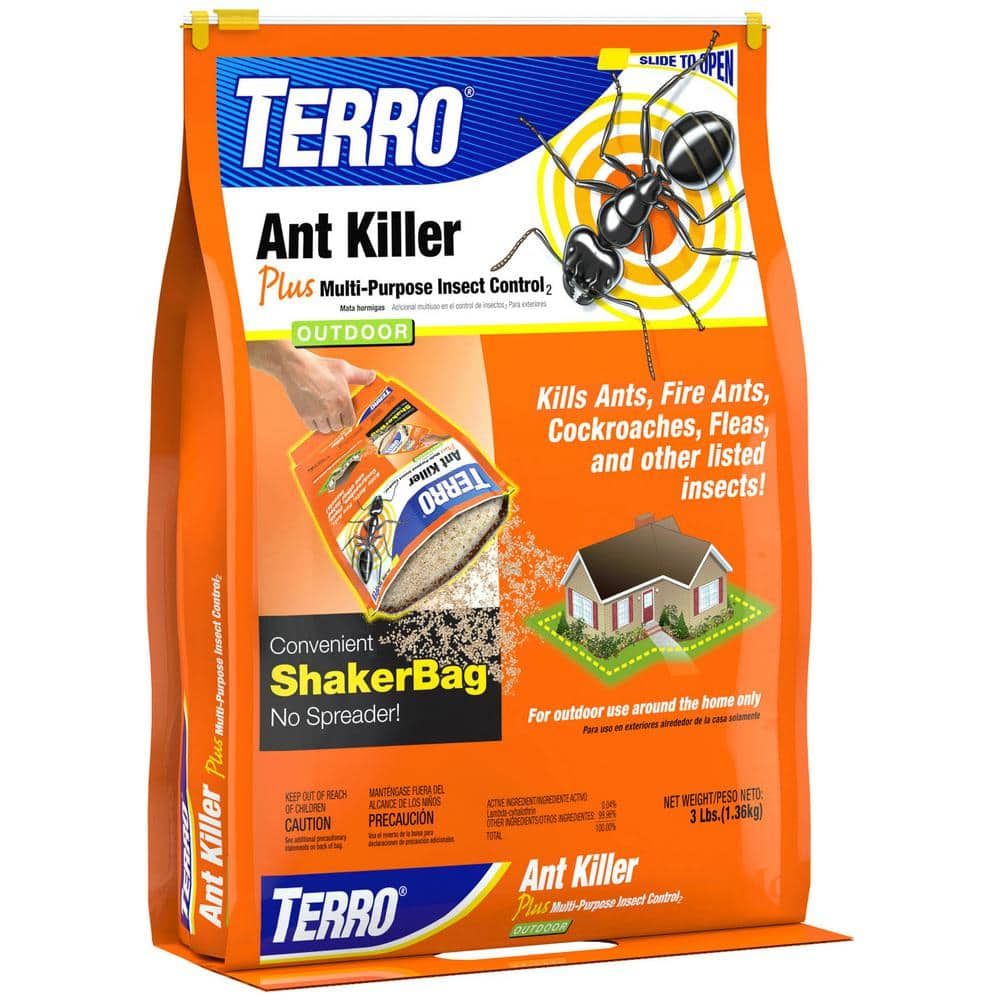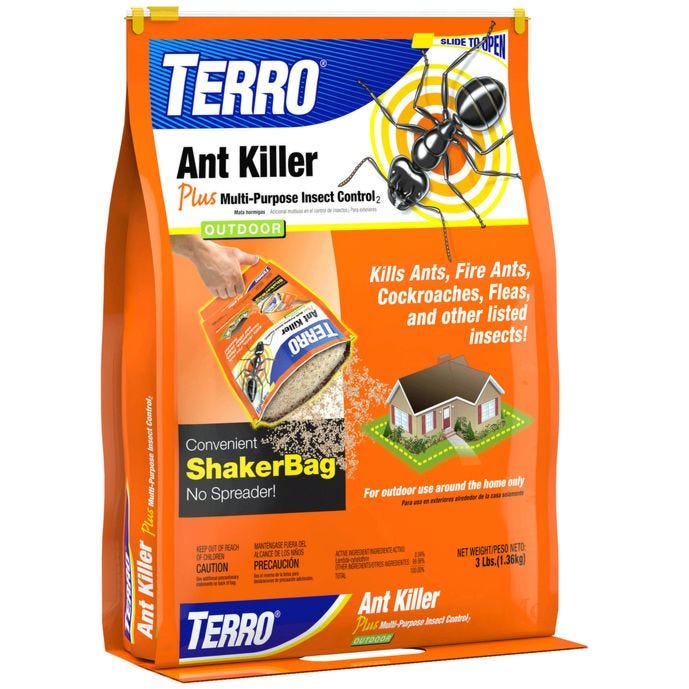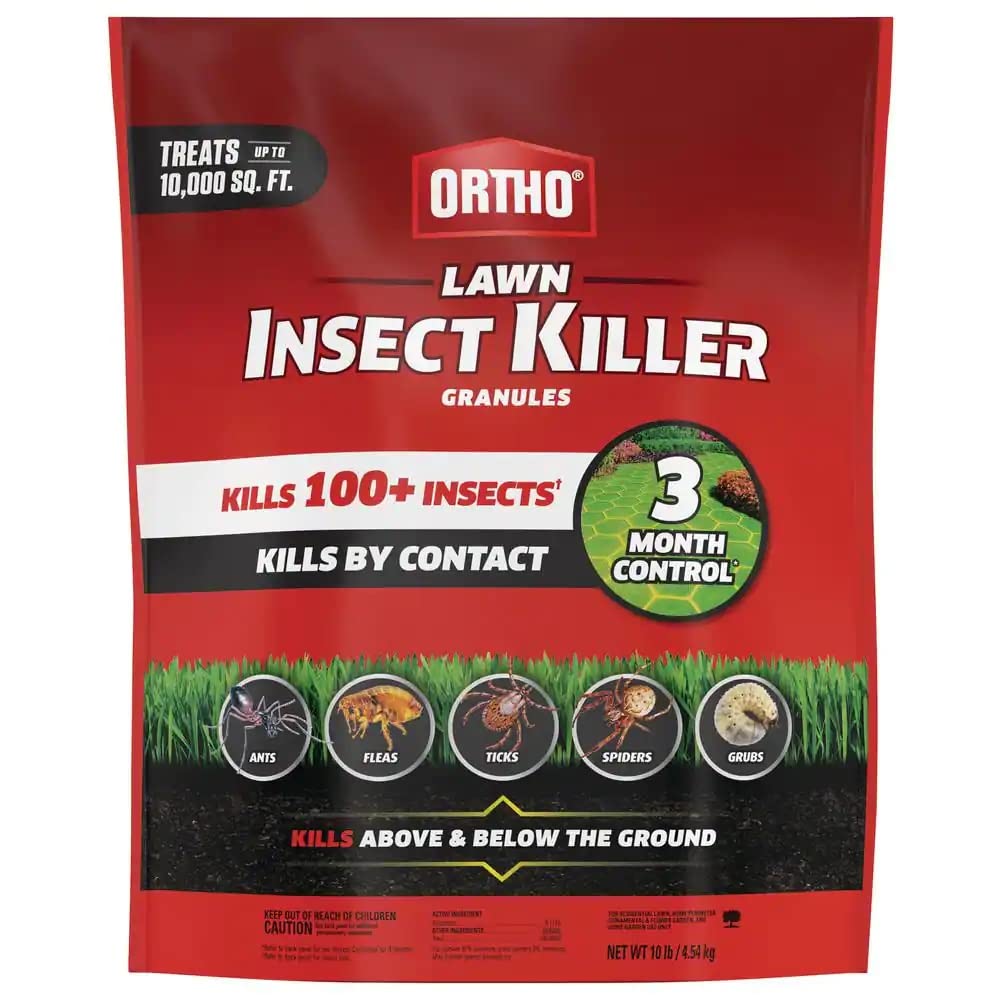The best ant killer for lawns is the Terro Outdoor Liquid Ant Baits. They effectively eliminate the entire ant colony, including the queen.
Battling ants in your lawn requires a powerful solution that targets the pests without damaging your grass. Terro Outdoor Liquid Ant Baits deliver precisely that. Designed for outdoor use, these baits attract foraging ants with a sweet liquid. Subsequently, the ants carry the lethal treat back to their nest, ensuring the demise of the colony from the inside.
These baits stand out for their ease of use and ability to reach the root of the ant problem – the nest itself. Whether you’re dealing with a minor infestation or a full-blown ant takeover, implementing the right ant control product is imperative for a pristine, ant-free lawn.
Introduction To Ant Infestations In Lawns
Picture a perfect, lush lawn; a soft, green carpet just outside your door. Now imagine discovering it’s home to a bustling ant city. Ants are a common sight in yards, but an overabundance can spell trouble for your grass and outdoor fun.
The Battle Beneath Your Grass
Below the serene surface of your lawn, a war is waging. Ants build intricate tunnels, disrupting roots and the soil structure. Your grass battles for nutrients and stability, often losing to the industrious insects.
Effective ant killers help reclaim your turf, allowing your lawn to thrive. This guide will arm you with the best solutions to win the underground fight. Let’s defend your grass together.
Consequences Of Ant Overpopulation
- Damage to grass and plants due to root disturbance and soil displacement.
- Bites and stings to pets and people, making the yard less enjoyable.
- Unsightly mounds and trails disrupting the lawn’s appearance.
- Attracts other pests, creating additional lawn challenges.
Keeping ant numbers in check preserves lawn health and beauty. It also ensures your outdoor space remains a safe haven for relaxation and play.
Identifying Common Lawn Ants
Ant invasions can turn your beautiful lawn into a warzone. Small as they are, ants can cause big trouble. Knowing which type of ant you’re dealing with is the first step in controlling them. Let’s explore the types of ants that might be living in your yard and the signs that indicate their presence.
Types Of Ants In Your Yard
Lawn ants come in different shapes and sizes. Each type has unique behaviors.
- Fire Ants: Known for their painful stings, these are reddish-brown.
- Carpenter Ants: Large and black, they carve out moist wood.
- Pavement Ants: Small and dark, they make homes under slabs.
- Field Ants: They build mounds in grassy areas.
Signs Of Ant Activity
Looking for ants can be tricky, but they leave clues. Keep an eye out for these signs:
- Mounds: Small dirt hills on your lawn are ant homes.
- Plant Damage: Ants can harm plants while they gather food.
- Indoor Scouts: Finding ants inside often means more are outside.
- Trails: Ants follow scent trails to food, which can lead to nests.
The Necessity Of Ant Control
A lawn is more than just an expanse of green; it’s the outdoor extension of our homes. But when ants invade, they can quickly turn this peaceful space into a source of irritation. Controlling these tiny trespassers is not just about maintaining aesthetics; it’s essential for safeguarding the health of your lawn and the well-being of those who enjoy it.
Protecting Lawn Health
Ants can cause significant damage to a lawn. Their nests create unsightly mounds, disturb root systems, and can lead to uneven surfaces. By identifying and combatting ant infestations, you’re taking a vital step to preserve the lushness and vitality of your grass. Effective ant killers can stop the problem at the source, ensuring your lawn remains a healthy, vibrant place for outdoor activities.
- Maintains grass uniformity
- Stops destruction of root systems
- Prevents soil erosion from tunneling
Preventing Ant Bites And Allergies
Ants don’t just harm your lawn; they pose risks to people too. Certain ant species bite, causing discomfort and potentially triggering allergic reactions. Children and pets, who spend ample time playing on the grass, are especially vulnerable. Using the best ant killer for your lawn helps minimize these health risks, creating a safer environment for everyone to enjoy.
| Ant Problem | Consequence | Solution |
|---|---|---|
| Bites | Skin irritation | Ant killer application |
| Allergies | Health risks | Regular lawn treatment |
Ant Killing Solutions
Dealing with an ant infestation in your lawn can be a tough battle. But, don’t worry! You have several ant killing solutions to choose from. Whether you prefer chemical solutions or natural and organic methods, there is a solution to meet your needs. Let’s explore some of the best ways to keep these tiny invaders at bay.
Chemical Ant Killers
Chemical ant killers are potent and fast-acting. They come in various forms including granules, liquids, and baits. Here are the most effective chemical solutions:
- Ant baits: Attract and poison ants, disrupting their colonies over time.
- Insecticide sprays: Provide immediate kill on contact and create barriers.
- Granular insecticides: Spread over the lawn for full coverage, targeting ants underground.
Remember to read instructions carefully before use. Protective gear is important when handling chemicals.
Natural And Organic Options
Prefer a greener approach? Natural ant killers are safe for kids, pets, and the environment. Consider these options:
- Diatomaceous earth: A powder that destroys ant exoskeletons.
- Boric acid: Acts as a stomach poison for ants, found in some natural baits.
- Essential oils: Like peppermint, which repels ants naturally.
With these options, you can treat your lawn without harsh chemicals. Always follow the guidelines for safe use.
Safety Considerations
Choosing the best ant killer for lawns involves more than just effectiveness. Safety is a top priority. You want a product that’ll eliminate ants without harming your loved ones or the environment. In this segment, we’ll navigate through essential safety measures.
Protecting Children And Pets
Children and pets are curious explorers. Their safety comes first. Here’s how to keep them safe:
- Opt for ant killers marked as safe for kids and animals.
- Choose products with a bittering agent to deter ingestion.
- Apply treatments when kids and pets are not in the area.
- After application, wait for the product to dry completely before allowing playtime on the lawn.
Environmental Impact
The health of our planet is crucial. Here’s how to choose ant killers that are friendly to the environment:
- Select products with natural ingredients, like botanical extracts.
- Avoid treatments that can contaminate water sources.
- Search for options that are EPA-approved for minimal ecological footprint.
- If possible, use biodegradable packaging to reduce waste.

Credit: www.homedepot.com
How To Apply Ant Killer Effectively
Fighting an ant invasion requires strategy. Knowing how to apply ant killer effectively can save your lawn from these tiny pests. Applying ant killer isn’t just about the product; it’s about the timing and technique. Get it right, and enjoy a lush, ant-free lawn.
Timing And Weather Conditions
Choose the right time for ant killer application. The goal is to target ants when they’re most active. This is typically when the soil temperature is above 60°F but below 80°F. Early morning or late afternoon is prime time. Check the weather forecast before application. Ideal conditions are dry with no rain expected for at least 24 hours.
Application Techniques
Technique matters. For granular ant killers, use a spreader for uniform distribution. Broadcasting by hand can lead to uneven coverage. For liquid treatments, use a sprayer. Make sure to cover the entire lawn, focusing on mounds. Don’t water the lawn immediately after application; this could dilute the solution. Wear protective gear and follow the product’s instructions closely.
Preventive Strategies
Before reaching for chemicals, consider these smart strategies. They will keep ants away from your lawn. A well-planned lawn keeps your ground ant-free. Think prevention over cure.
Landscaping To Deter Ants
Smart landscaping works wonders. It deters ants naturally. It’s simple and effective. Remember, ants love hiding spots. Avoid giving them any.
- Trim grass: Keep it short. Ants hide in long grass.
- Plant ant-repellent flora: Some plants repel ants. Mint, lavender, and rosemary work well.
- Use gravel or stone: Ants dislike crossing these materials. Use them in your garden borders.
Regular Maintenance To Keep Ants At Bay
Maintenance is key in ant prevention. A clean lawn is less inviting to pests. Here’s what to do:
- Clean up: Remove trash and leftover food promptly.
- Fix leaks: Ants seek water. No leaks mean no water for ants.
- Inspect regularly: Catch ant hills early. Deal with them quickly.
Remember these tips. Your lawn will be less attractive to ants. Prevention saves time and effort in the long run.

Credit: www.terro.com
Expert Advice And Tips
Are you facing an ant invasion in your lawn? Let’s tackle it with wisdom from lawn care mavens and tried-and-true methods from homeowners. Get ready to reclaim your green oasis!
Recommendations From Lawn Care Specialists
Lawn specialists suggest a multi-step battle plan. First, identify the ant species. Then, choose the right treatment. Here are their top picks:
- Baits: Specific to the ant type, they attract and poison the colony effectively.
- Sprays: Fast-acting for immediate relief, perfect for large infestations.
- Granules: Easy to spread, they provide long-lasting protection.
They also stress the importance of safety. Always follow the label directions closely.
Homeowners’ Successful Strategies
What works in the real world? Homeowners rave about these strategies:
| Strategy | Effectiveness | User-Friendly |
|---|---|---|
| Natural remedies like vinegar | Mild | High |
| Chemical ant killers | High | Moderate |
| Boric acid mixtures | Variable | Moderate |
Regular lawn maintenance is key. Trim plants often and water your lawn correctly to deter ants.
Product Reviews
Battling ant infestations in your lawn can be challenging. Finding the best ant killer is crucial for maintaining a healthy, ant-free yard. This segment dives into detailed reviews of the top products on the market. Ready to reclaim your green space? Let’s explore the options.
Top-Rated Ant Killers for LawnsTop-rated Ant Killers For Lawns
| Product Name | Type | Effective Time |
|---|---|---|
| Ant-B-Gone Granules | Granular | 24 hours |
| GreenShield Ant Spray | Liquid | Instant |
| NatureFight Ant Bait | Bait | 48 hours |
Ant-B-Gone Granules are effortless to apply and destroy colonies in a day. GreenShield Ant Spray offers immediate results on contact. NatureFight Ant Bait lures ants effectively and finishes them off within two days.
Pros and Cons of Popular SolutionsPros And Cons Of Popular Solutions
Ant-B-Gone Granules
- Pros: Easy to spread; Fast-acting; Long-lasting
- Cons: Harmful if ingested by pets; Not for indoor use
GreenShield Ant Spray
- Pros: Instant kill; Eco-friendly; Great for spot treatment
- Cons: Frequent application needed; Wind may affect spray
NatureFight Ant Bait
- Pros: Targets the whole colony; Safe around pets
- Cons: Slower results; Must be kept away from food areas

Credit: amdro2.int10.central.com
When To Call The Professionals
Fighting lawn pests can often be a do-it-yourself job. Yet, some situations are too tough for over-the-counter solutions. Knowing when to call in the professionals is key to saving your lawn from severe damage. In certain scenarios, enlisting expert help is not just advisable—it’s a necessity.
Severe Infestation Cases
Ant colonies in your lawn might start small, but they can grow swiftly. A severe infestation is easy to spot:
- Large mounds appear across the lawn.
- Plant damage becomes noticeable.
- Outdoor activities are disrupted.
If multiple treatments have failed and the problem persists, it’s time to seek professional help.
Hiring A Pest Control Service
The right pest control team uses specialized methods to deal with ants. They assess the situation, identifying the ant species and the best course of action. Here’s what professional services offer:
| Advantage | Description |
|---|---|
| Expertise | They know about different ant types and effective treatments. |
| Safety | Professionals handle pesticides safely, protecting your family and pets. |
| Effectiveness | Their methods often provide a long-term solution compared to DIY approaches. |
Contact a licensed pest control service if you’re facing an overwhelming ant problem. Ensuring your lawn’s health often relies on timely professional intervention.
Frequently Asked Questions Of Best Ant Killer For Lawns
What Is The Most Effective Ant Killer For Lawns?
An effective ant killer for lawns is a product specifically designed for outdoor use that targets common lawn ant species. It should eliminate the colony, not just surface ants, and offer residual control to prevent new ant invasions.
How Safe Are Lawn Ant Killers For Pets?
Pet-safe lawn ant killers are formulated to be low in toxicity when used as directed. Opt for products labeled as safe for pets, and always follow the application instructions closely to ensure your pets’ safety.
What Natural Remedies Work For Ant Control In Grass?
Natural remedies like diatomaceous earth, borax mixed with sugar, or a vinegar solution can help manage ants in grass. These options are eco-friendly and less harmful to non-target organisms in your lawn.
How Often Should I Apply Ant Killer To My Lawn?
The frequency of application depends on the product’s effectiveness and the severity of the ant infestation. Generally, reapplication might be necessary every 30-60 days, or as specified by the product’s guidelines.
Conclusion
Finding the perfect ant killer for your lawn doesn’t have to be a hurdle. The right product preserves your grass while eliminating pests. Always prioritize safety and effectiveness, considering local regulations and eco-friendliness. Choose wisely and enjoy a lush, ant-free lawn season after season.
Your grass—and your peace of mind—will thank you.

I’m MD Tanvir, and I bring years of expertise gained from working closely with pest control companies to the forefront. My journey in the industry has inspired me to launch Bug Battler, a platform aimed at equipping people with the know-how to combat pests autonomously. Through Bug Battler, I aim to empower individuals with practical insights to tackle pest infestations effectively.

